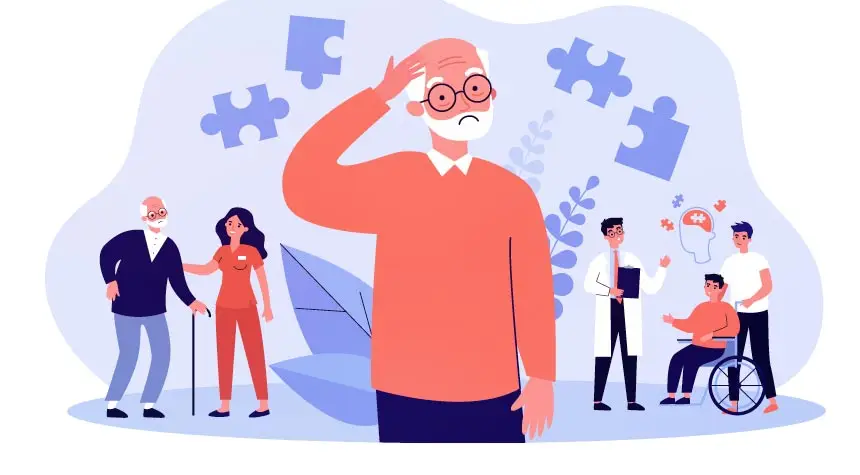Introduction
Alzheimer’s disease is a progressive brain disorder that gradually affects memory, thinking, behavior, and the ability to carry out daily activities. While the exact pace of progression varies from person to person, the disease generally follows a predictable path from mild memory changes to severe cognitive and physical decline. Understanding each stage helps patients, families, and caregivers prepare for what lies ahead and plan appropriate care.
Stage 1: Preclinical Alzheimer’s (No Noticeable Symptoms)
- What Happens:
- Brain changes—such as amyloid plaque buildup—begin years or even decades before symptoms appear.
- No obvious memory problems yet.
- What to Expect:
- May only be detected through specialized brain imaging or biomarkers in research settings.
- Care Approach:
- Focus on brain-healthy lifestyle choices like exercise, diet, and cognitive stimulation.
Stage 2: Very Mild Cognitive Decline (Normal Age-Related Forgetfulness or Early Changes)
- What Happens:
- Occasional memory lapses, such as forgetting words or misplacing objects.
- What to Expect:
- Symptoms may be indistinguishable from normal aging.
- Care Approach:
- Monitor for increased frequency or severity of memory lapses.
Stage 3: Mild Cognitive Decline (Early-Stage Alzheimer’s)
- What Happens:
- Noticeable difficulty remembering recent events.
- Trouble organizing tasks or finding the right words.
- Misplacing items more often.
- What to Expect:
- Friends and family may begin noticing changes.
- The person can still live independently but with occasional support.
- Care Approach:
- Begin future care planning and make lifestyle adjustments to maintain independence.
Stage 4: Moderate Cognitive Decline (Mild or Early Alzheimer’s)
- What Happens:
- Increasing difficulty with complex tasks (e.g., paying bills, planning meals).
- Forgetting personal history or details about life events.
- Possible mood changes, withdrawal from social activities.
- What to Expect:
- Diagnosis is often made at this stage.
- Care Approach:
- Provide reminders, structured routines, and emotional support.
Stage 5: Moderately Severe Cognitive Decline (Moderate or Middle Alzheimer’s)
- What Happens:
- Major memory gaps—forgetting phone numbers, addresses, or names of close family.
- Needing help with daily activities such as dressing or bathing.
- What to Expect:
- Increased confusion about time and place.
- Care Approach:
- Ensure a safe home environment and assist with personal care.
Stage 6: Severe Cognitive Decline (Moderately Severe or Middle to Late Alzheimer’s)
- What Happens:
- Loss of awareness of surroundings.
- Significant personality changes, possible suspicion, or anxiety.
- Trouble recognizing loved ones.
- What to Expect:
- Assistance needed for most daily activities.
- Care Approach:
- Full-time caregiving, emotional reassurance, and medical support.
Stage 7: Very Severe Cognitive Decline (Late-Stage Alzheimer’s)
- What Happens:
- Loss of ability to communicate clearly.
- Difficulty swallowing, walking, or controlling movement.
- Complete dependence on caregivers.
- What to Expect:
- High risk of infections, such as pneumonia.
- Care Approach:
- Comfort-focused care, palliative or hospice services.
Conclusion
Alzheimer’s disease progresses gradually, moving from subtle cognitive changes to complete dependence. While there’s no cure, early recognition and proactive planning can greatly improve quality of life for both patients and caregivers. Understanding the stages helps families prepare emotionally, financially, and logistically for the journey ahead.
FAQs
How long does each stage of Alzheimer’s last?
It varies—early stages may last years, while late stages can progress more quickly.
Can Alzheimer’s progression be slowed?
Certain medications, lifestyle changes, and therapies may help slow symptom progression, especially in early stages.
Is memory loss the only symptom of Alzheimer’s?
No—it also affects reasoning, language, mood, and the ability to perform daily tasks.
Do all patients go through every stage?
Yes, but the speed and severity vary greatly among individuals.
When is hospice care appropriate for Alzheimer’s patients?
Typically, in the final stage, the person is fully dependent and has limited physical function.






